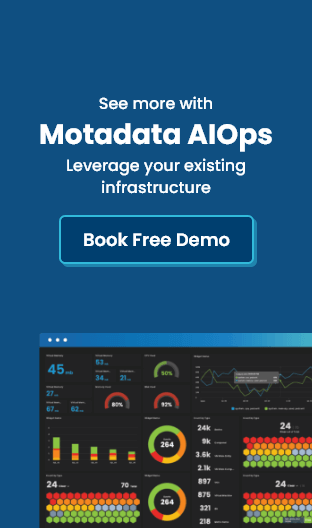AIOps is about enabling developers, program managers, service engineers, website reliability engineers etc. to efficiently build as well as run online services or applications at scale with AI & ML techniques.
AIOps is expected to help improve service quality. customer satisfaction, enhance technology productivity, and reduce cost.
With hype all around the world regarding artificial intelligence, IT leaders are sceptical whether it will actually be useful to them or will it add to their costs.
We’ve already covered the importance of AI in network monitoring in our previous blog, in this blog we have listed down the concerns of IT leads with AIOps platforms.
Why AIOps?
It is very obvious now that the tech industry is booming and transforming each and every day from delivering products to releasing services.
Accordingly, the way services are built and published differs from traditional products, which brings up the importance of operational efficiency for services.
DevOps for facilitating launch & development of services, has been embraced already.
With the proliferation of cloud computing systems, the scale and sophistication of services have increased tremendously.
The scale and complexity of services pose significant challenges to applications and service engineers on managing and economically and effectively building services with DevOps.
Within this circumstance, the expression AI Ops came out from Gartner to tackle the DevOps struggles with AI.
There is no broadly accepted definition of AI Ops. Gartner coined the term “AI Ops” back in 2016.
In general, AI Ops is all about empowering support and software engineers to assemble and operate services that are simple to support and maintain by using artificial intelligence and machine learning techniques.
The value of AI Ops could be important: ensuring service quality and client satisfaction, fostering engineering productivity, and reducing operational cost.
Real-World Challenges
The software business is still at the early stage of embracing and innovating AI Ops solutions.
On one hand, the community just started to realize the importance of AI Ops.
As per IDC, “By 2024, 60 percent of companies will have embraced ML/AI analytics for DevOps, accelerating software delivery and enhancing quality, security, and compliance through information integration, triggers, & predictive analytics”.
On the other hand, embracing them and building AI Ops solutions are hard from both non-invasive and technical perspectives.
Now the rest of the blog is inspired by Microsoft’s research paper on this topic. We’ve outlined the challenges of building AI Ops as follows.
1. Gaps in innovation methodologies & mindset
AI Ops requires holistic thinking & sufficient understanding regarding the entire problem space, from business value & constraints, data models, to the system and process integration related factors, etc.
There’s difficulty in mindset change from the traditional ways i.e. digging into individual instances by taking a look at bug reproducing steps and detailed logs, which is inefficient or even infeasible in large scale support situations to modern way of identifying patterns and to learn from history.
2. Engineering changes needed to support
AI Ops best practices are hard to implement for organizations of small sizes. Building AI Ops solution’s use cases requires technology efforts that are substantial.
AI Ops-oriented engineering remains at a very early stage, and also the very best practice/principles/design patterns are not well established in the industry yet.
For example, the AI Ops engineering principles should include constant model-quality identification and assurances, data/label quality tracking, and actionability of insights.
The data quality and quantity available now are not enough to fully utilise the potential of AI Ops solutions.
Although cloud services now accumulate terabytes and even petabytes of all information that is telemetry every day/month, there still lacks high-quality representation of data.
A continuous improvement of data quantity and quality is necessary.
A principled approach is needed for AI Ops solutions instead of ad-hoc logging for debugging a few problems.
3. Difficulty on building ML models for AIOps
Going by individual instances, detecting behaviour of providers, it’s difficult to get enough labels to understand “what’s abnormal” in certain scenarios, since almost every service is evolving with the change of customer requirements and underlying infrastructure changes.
The problem of building models lies in the quantity of the information that needs to be analysed and the complexity of services’ internal logic.
One Solution for All the Concerns
Need answers to your questions like where should workloads be placed for optimal performance and cost savings? How to maintain connectivity of applications to maximize availability?
How do I ensure maximum availability and performance? Am I doing enough for my network? Just by having an AI Ops platform isn’t enough, you will need round the clock network monitoring as well.
Having a layer of Artificial Intelligence on top of your network monitoring data adds the real intelligence & can address most of the challenges listed above. With Motadata you can achieve that.
Get all the answers to your questions. Reach out to us on sales@motadata.com
We will be happy to enlighten you on how our upcoming AIOps platform sweep you off your feet.
It can be the one stop solution to all your IT issue as it consists for network monitoring, application performance management, log management, network traffic analysis and more!



